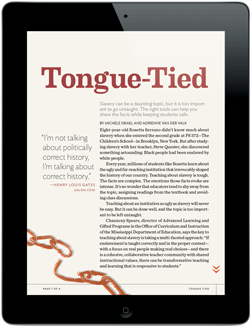 Reader Exchange
Reader Exchange
“Tongue-Tied” prompted conversation on the Web.
Thanks for the article. As far as using words, words have power. I prefer to state the following, “person who was enslaved,” as that puts the person first, circumstances after that. That includes any other descriptors, such as person who is experiencing homelessness, person who has diabetes, etc. We are all more than just one descriptor ...
—Submitted by Anonymous
I like the suggestion that language matters and that the use of the term “enslaved” is important. Similarly, I think that using the passive voice is misleading. So, for example, saying “hundreds of thousands of people—mostly from the Carolinas and Virginia—were sold to plantation owners farther southwest” hides the people who actually did the selling. It is important for students to understand that individual people did that selling and buying.
—Submitted by Anonymous
The power of words was a recurring theme among readers, from debating the use of the word slave to understanding the importance of using the correct pronouns when addressing transgender and gender-fluid students.
Easier Said Than Done
[On “The Gentle Catalyst”]
I feel it is easier to teach these things in a diverse classroom. How do you teach them when 85% are at poverty and they are 95% white?
Anonymous
Via Teaching Tolerance Magazine online
Middle-School Activist Inspired
I’m an 8th grade student at Mountain Ridge Middle School in Highlands Ranch, Colorado. The entire 8th grade is doing a 243 seconds for change project in which we have 243 seconds to deliver a speech on a social injustice. Out of nearly 1,000 8th graders I was the only one who decided to take a stand against racism. While everyone else is a three, four, or five-person group, through the process I have done this project alone. I am going to give the speech in a couple of days and I want to thank you guys. You gave me the resources, information, and inspiration I need to make a change. I am looking forward to making people in my area aware of racism as many people do not believe that it exists anymore. Thank you!
Matt Heutmaker
Via Email
Changing Lives in Ohio
… My students made amazing connections between the Civil Rights Movement and the Viva La Causa boycott based on your Cesar Chavez video kit that we had done earlier in the year. I am a true fan of the work you are doing at Teaching Tolerance. You have touched so many lives over the years here in Elyria, Ohio, and I have learned right along with my students. I never finish one of your units without feeling that activist fire ignited inside me and can only hope and pray that my students feel that same warmth and become conductors of change throughout the years. Thank you so much for today’s lesson!
Dawn Neely Randall
Via Facebook
Asking for Gender Pronouns Helps
[On “The Problem with Pronouns”] Great article. As a teacher, this situation arose once on the first day of school, and I am so glad that I asked. When I was learning names, I asked one-to-one, “Do you go by a nickname?” and “What gender pronoun do you prefer?” [One] student was surprised that I asked, but not offended. It made a great start for the year in our class, and the student went on to become a strong public advocate in the district for transgender issues and felt comfortable bringing awareness to students in the class.
liveonfred
Via Teaching Tolerance blog
What About School Librarians?
[On “Picture Imperfect”] As much as I agree with the points made in this article, I think an extremely valid point was missed by the author. As a school library media specialist, I am trained in book selection practices as are my colleagues. We are the group that can—and should—be called on to assist classroom teachers. We must also model inclusiveness in our school libraries for all of our students and teachers. I wish the author had included the use of the professional book “experts”—your school librarians—as one of his tips on how to achieve this most important inclusivity. Classroom teachers—please allow us to assist you in this process!
Anonymous
Via Teaching Tolerance Magazine online
Editor’s note
We agree! See “Check It Out” in this issue to learn how media specialists can help diversify learning throughout the building.
Word Choice Matters
[On “An Educator’s Guide to the Immigration Debate”] Let’s also address how the terms “illegals” and “illegal immigrants” are more political than accurate. This goes a long way to help humanize the issue, as well as let students see the ramifications of word choice, past and present.
Caran Howard
Via Facebook
Tell Us What You Think!
Have an opinion about something you see in Teaching Tolerance magazine or on our website? Contact us or mail a letter to 400 Washington Ave., Montgomery, AL 36104.

0 COMMENTS